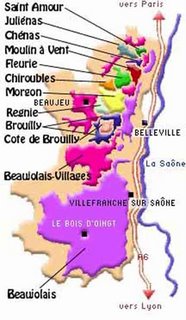Barkfest
 I'm starting to write an article about Beaujolais--not the cheapo, just-arrived Beaujolais nouveau of the third week of November, but the pricier Beaujolais crus that improve with age. A cru in French is a vineyard; with respect to Beaujolais, the term refers to the ten areas in the Beaujolais region where these potentially excellent wines are made.
I'm starting to write an article about Beaujolais--not the cheapo, just-arrived Beaujolais nouveau of the third week of November, but the pricier Beaujolais crus that improve with age. A cru in French is a vineyard; with respect to Beaujolais, the term refers to the ten areas in the Beaujolais region where these potentially excellent wines are made.The ten appellations, each designating a specific area in the region, are: Brouilly, Chénas, Chiroubles, Côte de Brouilly, Fleurie, Juliénas, Morgon, Moulin à Vent, Régnié, and Saint-Amour. Typically, these wines are labelled with the individual appellation. The word "Beaujolais" may be nowhere evident on the bottle. Many consumers are therefore unaware that these complex wines, worthy of cellaring, are varieties of Beaujolais. This ignorance contributes to the stereotype of Beaujolais as an inexpensive, easy-drinking wine of little complexity.
The region itself is, like every other wine-growing region of France, picturesque and beautiful. Every square centimeter of every hectare is lovingly and painstakingly cultivated and cared for. There might be people who can visit such a place and not want to stay forever, but I'm not one of them.
My dog seems to be a bit of a Francophile, like me. She's never been to the country, but she seems particularly attuned to the language. Taz responds much better to commands in French than in English. "Do you want to go for a walk?" produces a mildly interested prick of the ears, while "Tu veux te promener?" occasions a frenzy of barking and a wild scamble for the door.
Last night I was reciting the ten Beaujolais crus to her, in alphabetical order. Taz began a volley of barking; by the time I got to "Regnié," she seemed ready to knock me down. It's hard sometimes to figure out what's going on inside the brain of a dog. Does something about the inflection of French set her off? Does it sound similar enough to commands related to joyous topics like walks and treats to frustrate her, since I'm remaining in my chair? Or--as I like to think--is she saying, "YES! Let's go! Let's go! When do we sail? Let's go!"
Labels: beaujolais, cockador, wine


